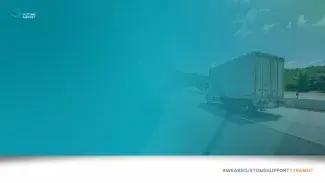Our specialists answer the most frequently asked questions about this new measure below:
What has changed?
There is now a penalty policy for late transit declarations in the NCTS system. These penalties apply to transit declarations released on 1 January 2024 or later.
How high is the fine?
The amount of the default fine is €140 to €355 for companies that systematically break the rules and are therefore in default. Customs will agree on a course for improvement with these companies. If intent or gross negligence is involved, a penalty for the offence will follow, the amount of which depends on the offence and the circumstance.
Which scheme do these rules apply to?
Initially, the penalty policy only applies to transit declarations released on 1 January 2024 or later.
If a customer is frequently late in declaring a transit, will there be further consequences for the company in question?
Repeated offences may lead to suspension of the authorisation and eventual revocation of the authorisation for simplified procedures. Exclusion from using NCTS may also follow.
What is the process for deregistering transit documents?
The deregistration process in NCTS is largely automated. This process has two steps:
Step 1: the arrival notification: once the goods have reached their final destination, the system indicates that the shipment has arrived by submitting an arrival notification. After the arrival notification, permission to unload is given by customs.
Step 2: if the customs transport is deregistered in accordance with the procedure, a conformity check is carried out after unloading. Depending on the findings, the transit procedure is terminated.
This is a licensed situation.
Which supporting documents should be shared with customs in transit?
Deregistering a transit shipment in the NCTS is also largely automated.
Once the goods have reached their final destination, if the arrival notification is correct, the system will automatically regard the consignment as deregistered. No physical documents are required for this automatic sign-off.
However, if a follow-up arrangement is chosen for the goods after the sign-off, such as import into free circulation, then the relevant commercial documents such as invoice, bill of lading or CMR are necessary. This is so that the final customs declaration can be made correctly.
Within how much time should the transit be closed?
Transit must be completed at the destination office within the stipulated time. This is done with the submission of the arrival notification. The deadline depends on the transport route and mode.
Why has customs come up with this policy?
Customs wants to contribute to economic growth and a favourable business climate. Fines are not an end in themselves, but a means: customs wants to motivate companies to comply with the rules. This may require a change in processes. With this measure, customs can contribute to fast and efficient handling of goods in the chain.
The new Dutch penalty policy is in line with broader European efforts to digitalise customs procedures and make them more efficient, as well as to combat fraud. The European Commission encourages member states to enforce more strictly. Similar hefty fines for late notifications are also seen in other EU countries with a lot of transit traffic. We can therefore see a broader movement towards less tolerance and higher consequences for customs violations in general.
The policy also fits into a trend of stricter requirements and greater controls around customs procedures, due to increased risks such as Brexit and sanctions. In this way, customs places more responsibility on businesses.















